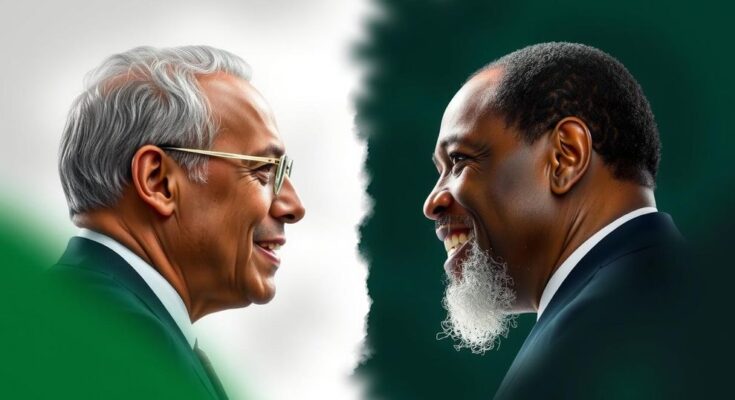Ghana’s recent elections showcased a robust democratic process with former President John Mahama winning 56.55% of votes, compared to Nigeria’s troubled electoral history marred by violence and fraud, resulting in just 26.7% voter turnout in the 2023 presidential election. While Ghana demonstrated political stability and citizen engagement, Nigeria’s elections remain contested and distrustful, highlighting the need for reform and adherence to democratic practices.
Elections in Nigeria and Ghana present a stark contrast in terms of democracy and electoral integrity. While Ghana recently conducted a successful election on December 7, where former President John Mahama triumphed with a substantial majority, Nigeria continues to grapple with political dysfunction and a lack of public trust in its electoral process. Ghana’s election demonstrated a commitment to democratic principles, with a voter turnout of 60.9 percent, in clear opposition to Nigeria’s dismal 26.7 percent in the 2023 presidential election.
The electoral process in Ghana is characterized by competitive politics and a strong adherence to democratic norms. John Mahama of the National Democratic Congress won 56.55 percent of the votes, with Vice-President Mahamudu Bawumia acknowledging the election results gracefully, thereby promoting political stability. The overall atmosphere during voting was calm, with citizens free to conduct their daily activities, devoid of intimidation or violence.
Conversely, Nigeria’s elections have been marred by violence, fraud, and electoral malpractice, making it difficult for citizens to trust their electoral body. The Independent National Electoral Commission (INEC) has struggled to maintain transparency, with its chairman, Mahmood Yakubu, acknowledging that Ghana adopted elements from Nigeria’s electoral framework. However, Ghana has effectively implemented these practices, enhancing its electoral credibility.
The African Union and European Union observation missions have offered contrasting evaluations of these nations’ electoral processes. The AU praised Ghana’s commitment to democracy, while the EU criticized Nigeria’s elections for lacking transparency and public confidence. Consequently, National and state elections in Nigeria have seen an alarming trend of rejection by the losing candidates, denying the legitimacy of the electoral outcome.
Furthermore, the alarming habit of vote-buying and the influence of security agents and government officials have rendered Nigeria’s elections akin to a fragmented bazaar rather than a democratic exercise. This situation is exacerbated by Nigerian voters’ tendency to continuously choose the same parties, despite ongoing hardships inflicted by political elites.
Despite the troubling conditions in Nigeria, Ghana’s democracy serves as a guiding model. The nation has consistently ousted ruling parties for poor performance, exemplifying active citizen engagement and adherence to electoral laws. Nigeria’s electoral officials must take note of Ghana’s substantial progress, as they strive to rebuild trust in their electoral system and improve voter turnout.
The stark differences between the political evolutions of Nigeria and Ghana highlight significant challenges and successes within their electoral processes. Both countries gained independence within three years of each other, yet their political landscapes diverge sharply. Ghana has successfully transitioned through multiple elections with increasing democratic principles, while Nigeria struggles with deep-rooted issues of electoral malpractice, violence, and lack of public confidence in its political institutions. Understanding these contrasting paths is crucial in analyzing the effectiveness of their respective governance systems.
In conclusion, the electoral experiences of Nigeria and Ghana underscore the importance of democratic integrity and effective governance. Ghana’s recent elections exemplify a well-functioning democracy with high voter participation and peaceful transitions of power. In contrast, Nigeria’s electoral process is plagued by violence and distrust, resulting in poor voter turnout and political instability. To foster a healthier democratic environment, Nigeria must emulate Ghana’s respect for electoral laws, strengthen its institutions, and enhance citizen engagement in the political process.
Original Source: punchng.com




